Palliative Care: Ethical, Cultural, and Personal Beliefs Reflection
VerifiedAdded on 2022/08/31
|9
|2180
|19
Essay
AI Summary
This essay delves into the multifaceted aspects of palliative care, focusing on ethical decision-making, cultural considerations, and the reflection of personal beliefs in the context of caring for a patient named John. The author, a registered nurse, examines the importance of collaborative ethical decision-making within an interdisciplinary team, emphasizing the ethical principles of autonomy, beneficence, non-maleficence, and justice. The essay highlights the significance of cultural sensitivity, particularly regarding John, an Aboriginal and Torres Strait Islander patient, and his wishes to uphold cultural practices and traditions, including the desire to die at home with family. Furthermore, the author reflects on their personal beliefs and how they navigate potential conflicts between these beliefs and the patient's autonomy, ensuring the provision of respectful and culturally appropriate care, and ultimately supporting John's decision to refuse further treatment and spend his remaining time with his family.
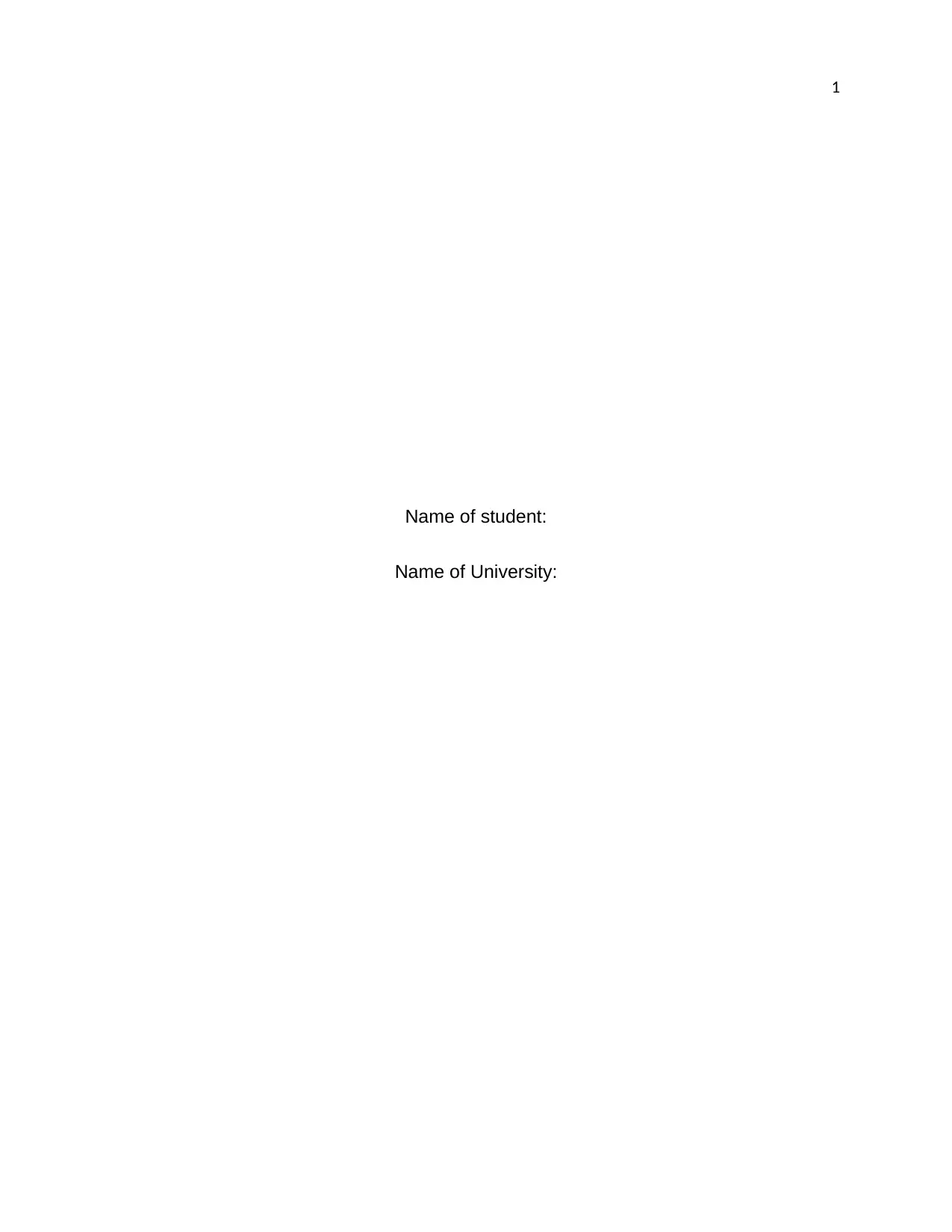
1
Name of student:
Name of University:
Name of student:
Name of University:
Paraphrase This Document
Need a fresh take? Get an instant paraphrase of this document with our AI Paraphraser
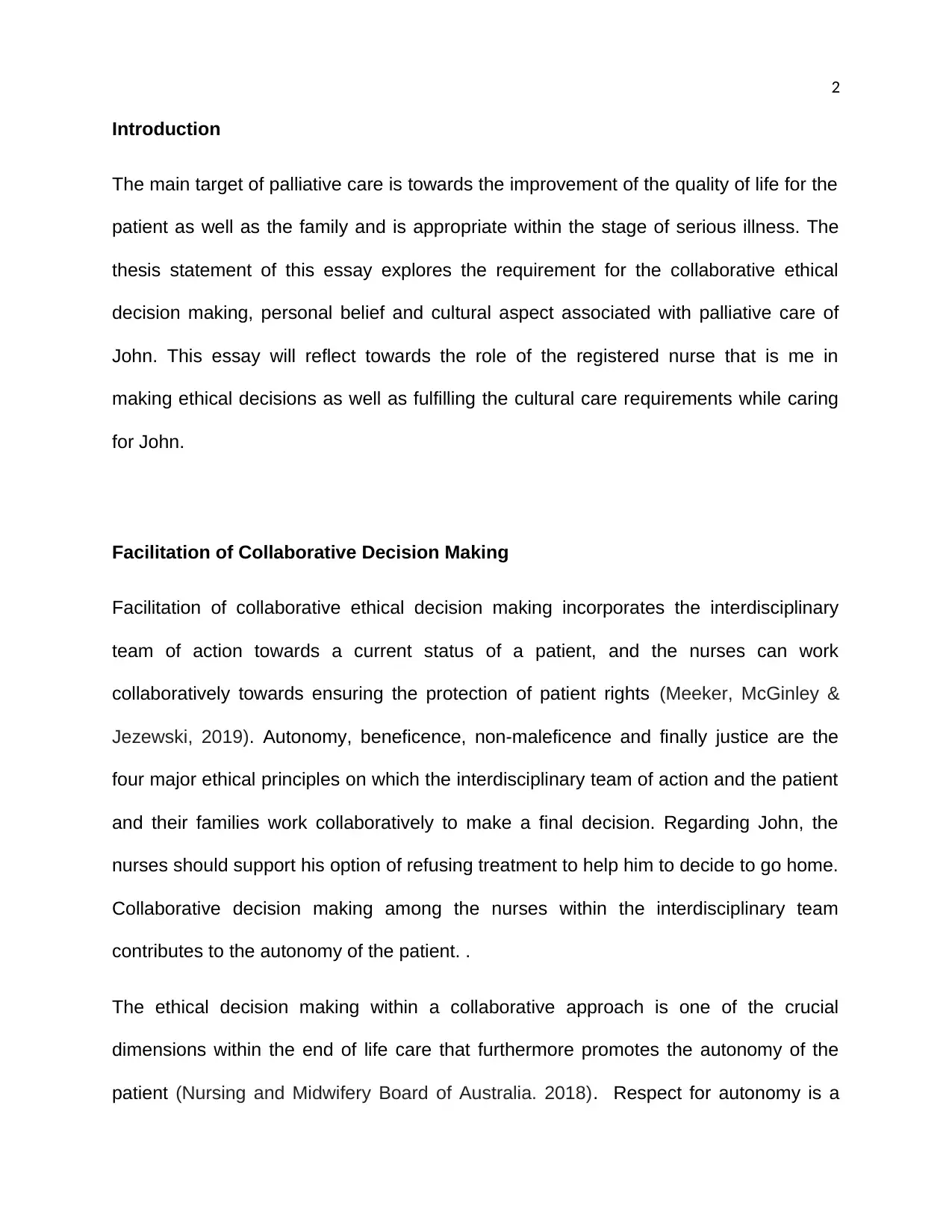
2
Introduction
The main target of palliative care is towards the improvement of the quality of life for the
patient as well as the family and is appropriate within the stage of serious illness. The
thesis statement of this essay explores the requirement for the collaborative ethical
decision making, personal belief and cultural aspect associated with palliative care of
John. This essay will reflect towards the role of the registered nurse that is me in
making ethical decisions as well as fulfilling the cultural care requirements while caring
for John.
Facilitation of Collaborative Decision Making
Facilitation of collaborative ethical decision making incorporates the interdisciplinary
team of action towards a current status of a patient, and the nurses can work
collaboratively towards ensuring the protection of patient rights (Meeker, McGinley &
Jezewski, 2019). Autonomy, beneficence, non-maleficence and finally justice are the
four major ethical principles on which the interdisciplinary team of action and the patient
and their families work collaboratively to make a final decision. Regarding John, the
nurses should support his option of refusing treatment to help him to decide to go home.
Collaborative decision making among the nurses within the interdisciplinary team
contributes to the autonomy of the patient. .
The ethical decision making within a collaborative approach is one of the crucial
dimensions within the end of life care that furthermore promotes the autonomy of the
patient (Nursing and Midwifery Board of Australia. 2018). Respect for autonomy is a
Introduction
The main target of palliative care is towards the improvement of the quality of life for the
patient as well as the family and is appropriate within the stage of serious illness. The
thesis statement of this essay explores the requirement for the collaborative ethical
decision making, personal belief and cultural aspect associated with palliative care of
John. This essay will reflect towards the role of the registered nurse that is me in
making ethical decisions as well as fulfilling the cultural care requirements while caring
for John.
Facilitation of Collaborative Decision Making
Facilitation of collaborative ethical decision making incorporates the interdisciplinary
team of action towards a current status of a patient, and the nurses can work
collaboratively towards ensuring the protection of patient rights (Meeker, McGinley &
Jezewski, 2019). Autonomy, beneficence, non-maleficence and finally justice are the
four major ethical principles on which the interdisciplinary team of action and the patient
and their families work collaboratively to make a final decision. Regarding John, the
nurses should support his option of refusing treatment to help him to decide to go home.
Collaborative decision making among the nurses within the interdisciplinary team
contributes to the autonomy of the patient. .
The ethical decision making within a collaborative approach is one of the crucial
dimensions within the end of life care that furthermore promotes the autonomy of the
patient (Nursing and Midwifery Board of Australia. 2018). Respect for autonomy is a
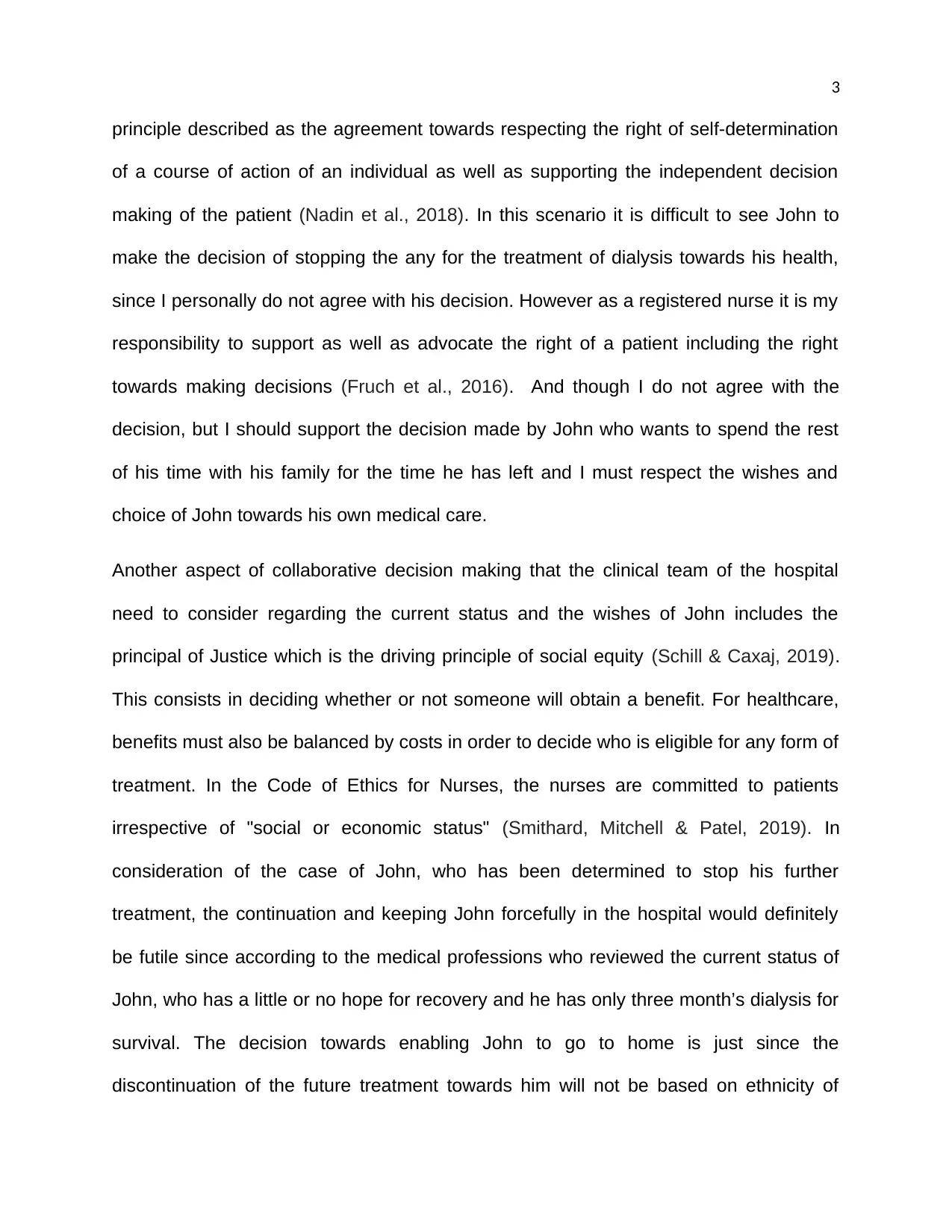
3
principle described as the agreement towards respecting the right of self-determination
of a course of action of an individual as well as supporting the independent decision
making of the patient (Nadin et al., 2018). In this scenario it is difficult to see John to
make the decision of stopping the any for the treatment of dialysis towards his health,
since I personally do not agree with his decision. However as a registered nurse it is my
responsibility to support as well as advocate the right of a patient including the right
towards making decisions (Fruch et al., 2016). And though I do not agree with the
decision, but I should support the decision made by John who wants to spend the rest
of his time with his family for the time he has left and I must respect the wishes and
choice of John towards his own medical care.
Another aspect of collaborative decision making that the clinical team of the hospital
need to consider regarding the current status and the wishes of John includes the
principal of Justice which is the driving principle of social equity (Schill & Caxaj, 2019).
This consists in deciding whether or not someone will obtain a benefit. For healthcare,
benefits must also be balanced by costs in order to decide who is eligible for any form of
treatment. In the Code of Ethics for Nurses, the nurses are committed to patients
irrespective of "social or economic status" (Smithard, Mitchell & Patel, 2019). In
consideration of the case of John, who has been determined to stop his further
treatment, the continuation and keeping John forcefully in the hospital would definitely
be futile since according to the medical professions who reviewed the current status of
John, who has a little or no hope for recovery and he has only three month’s dialysis for
survival. The decision towards enabling John to go to home is just since the
discontinuation of the future treatment towards him will not be based on ethnicity of
principle described as the agreement towards respecting the right of self-determination
of a course of action of an individual as well as supporting the independent decision
making of the patient (Nadin et al., 2018). In this scenario it is difficult to see John to
make the decision of stopping the any for the treatment of dialysis towards his health,
since I personally do not agree with his decision. However as a registered nurse it is my
responsibility to support as well as advocate the right of a patient including the right
towards making decisions (Fruch et al., 2016). And though I do not agree with the
decision, but I should support the decision made by John who wants to spend the rest
of his time with his family for the time he has left and I must respect the wishes and
choice of John towards his own medical care.
Another aspect of collaborative decision making that the clinical team of the hospital
need to consider regarding the current status and the wishes of John includes the
principal of Justice which is the driving principle of social equity (Schill & Caxaj, 2019).
This consists in deciding whether or not someone will obtain a benefit. For healthcare,
benefits must also be balanced by costs in order to decide who is eligible for any form of
treatment. In the Code of Ethics for Nurses, the nurses are committed to patients
irrespective of "social or economic status" (Smithard, Mitchell & Patel, 2019). In
consideration of the case of John, who has been determined to stop his further
treatment, the continuation and keeping John forcefully in the hospital would definitely
be futile since according to the medical professions who reviewed the current status of
John, who has a little or no hope for recovery and he has only three month’s dialysis for
survival. The decision towards enabling John to go to home is just since the
discontinuation of the future treatment towards him will not be based on ethnicity of
⊘ This is a preview!⊘
Do you want full access?
Subscribe today to unlock all pages.

Trusted by 1+ million students worldwide
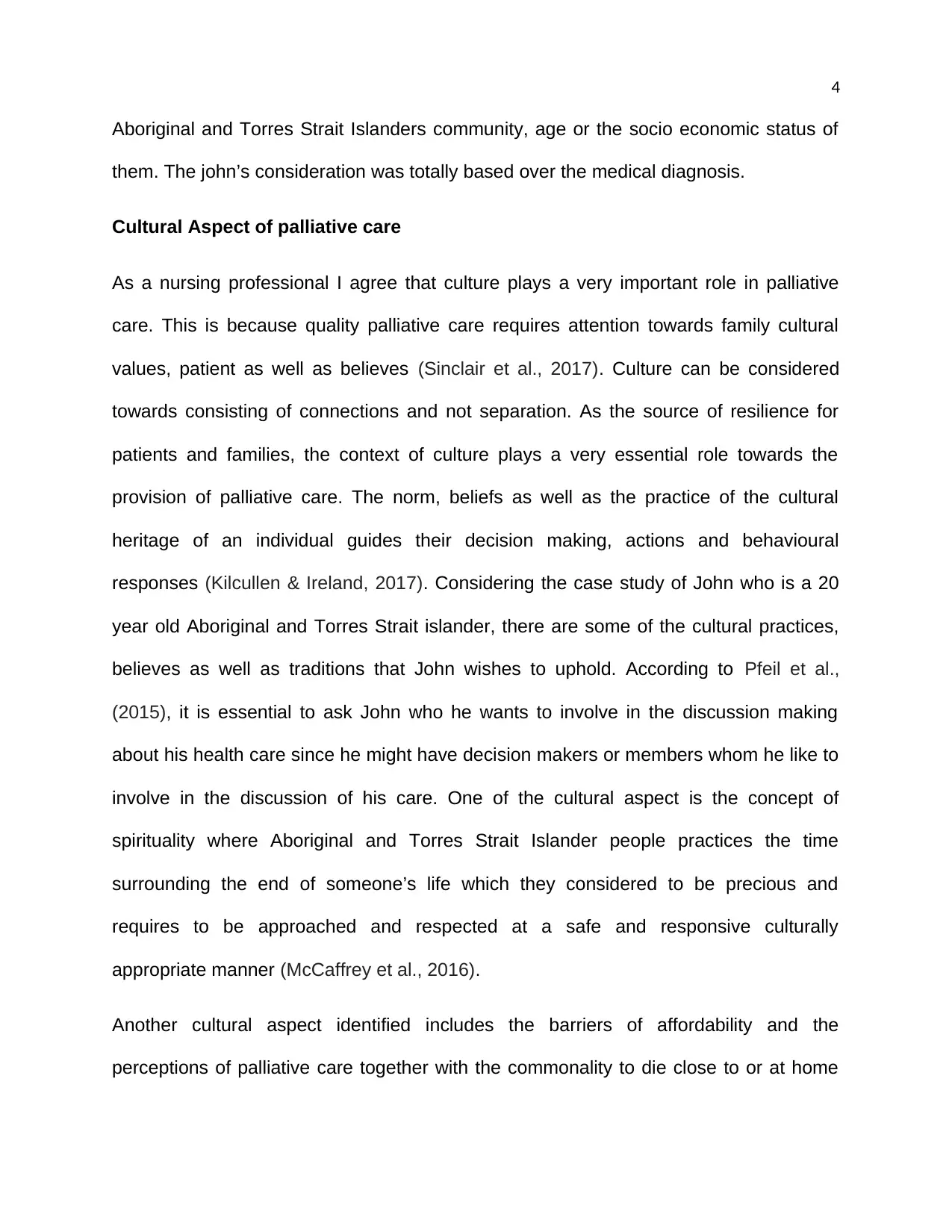
4
Aboriginal and Torres Strait Islanders community, age or the socio economic status of
them. The john’s consideration was totally based over the medical diagnosis.
Cultural Aspect of palliative care
As a nursing professional I agree that culture plays a very important role in palliative
care. This is because quality palliative care requires attention towards family cultural
values, patient as well as believes (Sinclair et al., 2017). Culture can be considered
towards consisting of connections and not separation. As the source of resilience for
patients and families, the context of culture plays a very essential role towards the
provision of palliative care. The norm, beliefs as well as the practice of the cultural
heritage of an individual guides their decision making, actions and behavioural
responses (Kilcullen & Ireland, 2017). Considering the case study of John who is a 20
year old Aboriginal and Torres Strait islander, there are some of the cultural practices,
believes as well as traditions that John wishes to uphold. According to Pfeil et al.,
(2015), it is essential to ask John who he wants to involve in the discussion making
about his health care since he might have decision makers or members whom he like to
involve in the discussion of his care. One of the cultural aspect is the concept of
spirituality where Aboriginal and Torres Strait Islander people practices the time
surrounding the end of someone’s life which they considered to be precious and
requires to be approached and respected at a safe and responsive culturally
appropriate manner (McCaffrey et al., 2016).
Another cultural aspect identified includes the barriers of affordability and the
perceptions of palliative care together with the commonality to die close to or at home
Aboriginal and Torres Strait Islanders community, age or the socio economic status of
them. The john’s consideration was totally based over the medical diagnosis.
Cultural Aspect of palliative care
As a nursing professional I agree that culture plays a very important role in palliative
care. This is because quality palliative care requires attention towards family cultural
values, patient as well as believes (Sinclair et al., 2017). Culture can be considered
towards consisting of connections and not separation. As the source of resilience for
patients and families, the context of culture plays a very essential role towards the
provision of palliative care. The norm, beliefs as well as the practice of the cultural
heritage of an individual guides their decision making, actions and behavioural
responses (Kilcullen & Ireland, 2017). Considering the case study of John who is a 20
year old Aboriginal and Torres Strait islander, there are some of the cultural practices,
believes as well as traditions that John wishes to uphold. According to Pfeil et al.,
(2015), it is essential to ask John who he wants to involve in the discussion making
about his health care since he might have decision makers or members whom he like to
involve in the discussion of his care. One of the cultural aspect is the concept of
spirituality where Aboriginal and Torres Strait Islander people practices the time
surrounding the end of someone’s life which they considered to be precious and
requires to be approached and respected at a safe and responsive culturally
appropriate manner (McCaffrey et al., 2016).
Another cultural aspect identified includes the barriers of affordability and the
perceptions of palliative care together with the commonality to die close to or at home
Paraphrase This Document
Need a fresh take? Get an instant paraphrase of this document with our AI Paraphraser
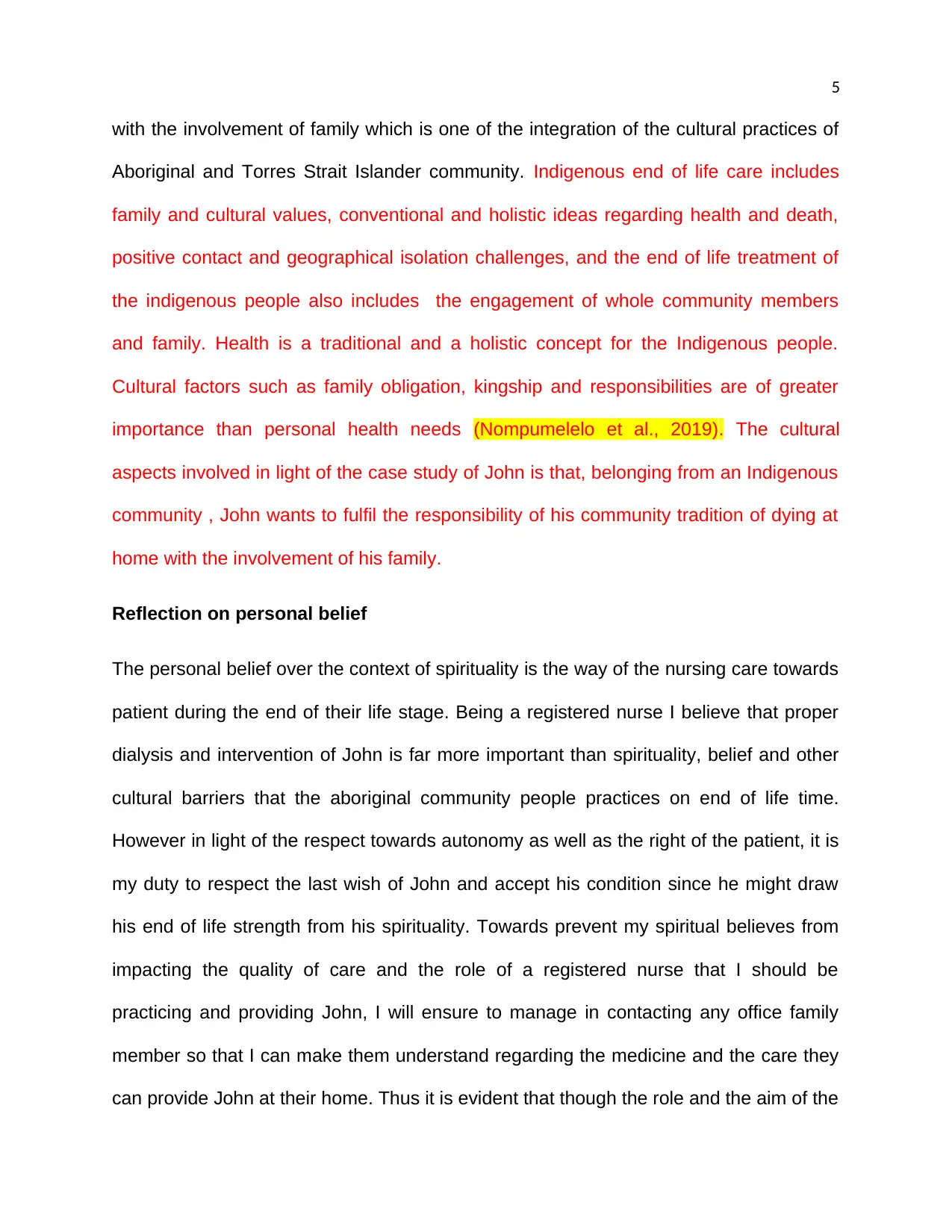
5
with the involvement of family which is one of the integration of the cultural practices of
Aboriginal and Torres Strait Islander community. Indigenous end of life care includes
family and cultural values, conventional and holistic ideas regarding health and death,
positive contact and geographical isolation challenges, and the end of life treatment of
the indigenous people also includes the engagement of whole community members
and family. Health is a traditional and a holistic concept for the Indigenous people.
Cultural factors such as family obligation, kingship and responsibilities are of greater
importance than personal health needs (Nompumelelo et al., 2019). The cultural
aspects involved in light of the case study of John is that, belonging from an Indigenous
community , John wants to fulfil the responsibility of his community tradition of dying at
home with the involvement of his family.
Reflection on personal belief
The personal belief over the context of spirituality is the way of the nursing care towards
patient during the end of their life stage. Being a registered nurse I believe that proper
dialysis and intervention of John is far more important than spirituality, belief and other
cultural barriers that the aboriginal community people practices on end of life time.
However in light of the respect towards autonomy as well as the right of the patient, it is
my duty to respect the last wish of John and accept his condition since he might draw
his end of life strength from his spirituality. Towards prevent my spiritual believes from
impacting the quality of care and the role of a registered nurse that I should be
practicing and providing John, I will ensure to manage in contacting any office family
member so that I can make them understand regarding the medicine and the care they
can provide John at their home. Thus it is evident that though the role and the aim of the
with the involvement of family which is one of the integration of the cultural practices of
Aboriginal and Torres Strait Islander community. Indigenous end of life care includes
family and cultural values, conventional and holistic ideas regarding health and death,
positive contact and geographical isolation challenges, and the end of life treatment of
the indigenous people also includes the engagement of whole community members
and family. Health is a traditional and a holistic concept for the Indigenous people.
Cultural factors such as family obligation, kingship and responsibilities are of greater
importance than personal health needs (Nompumelelo et al., 2019). The cultural
aspects involved in light of the case study of John is that, belonging from an Indigenous
community , John wants to fulfil the responsibility of his community tradition of dying at
home with the involvement of his family.
Reflection on personal belief
The personal belief over the context of spirituality is the way of the nursing care towards
patient during the end of their life stage. Being a registered nurse I believe that proper
dialysis and intervention of John is far more important than spirituality, belief and other
cultural barriers that the aboriginal community people practices on end of life time.
However in light of the respect towards autonomy as well as the right of the patient, it is
my duty to respect the last wish of John and accept his condition since he might draw
his end of life strength from his spirituality. Towards prevent my spiritual believes from
impacting the quality of care and the role of a registered nurse that I should be
practicing and providing John, I will ensure to manage in contacting any office family
member so that I can make them understand regarding the medicine and the care they
can provide John at their home. Thus it is evident that though the role and the aim of the
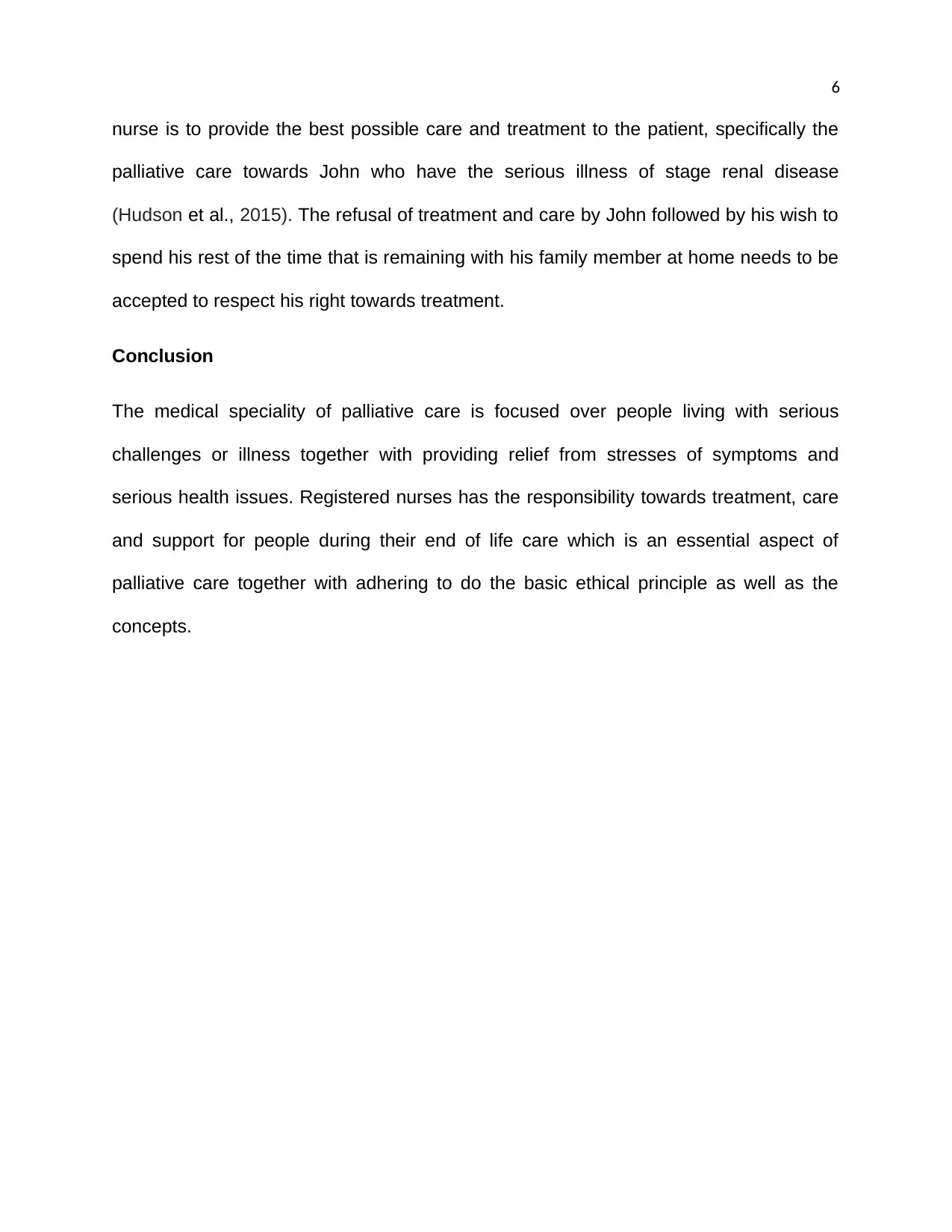
6
nurse is to provide the best possible care and treatment to the patient, specifically the
palliative care towards John who have the serious illness of stage renal disease
(Hudson et al., 2015). The refusal of treatment and care by John followed by his wish to
spend his rest of the time that is remaining with his family member at home needs to be
accepted to respect his right towards treatment.
Conclusion
The medical speciality of palliative care is focused over people living with serious
challenges or illness together with providing relief from stresses of symptoms and
serious health issues. Registered nurses has the responsibility towards treatment, care
and support for people during their end of life care which is an essential aspect of
palliative care together with adhering to do the basic ethical principle as well as the
concepts.
nurse is to provide the best possible care and treatment to the patient, specifically the
palliative care towards John who have the serious illness of stage renal disease
(Hudson et al., 2015). The refusal of treatment and care by John followed by his wish to
spend his rest of the time that is remaining with his family member at home needs to be
accepted to respect his right towards treatment.
Conclusion
The medical speciality of palliative care is focused over people living with serious
challenges or illness together with providing relief from stresses of symptoms and
serious health issues. Registered nurses has the responsibility towards treatment, care
and support for people during their end of life care which is an essential aspect of
palliative care together with adhering to do the basic ethical principle as well as the
concepts.
⊘ This is a preview!⊘
Do you want full access?
Subscribe today to unlock all pages.

Trusted by 1+ million students worldwide
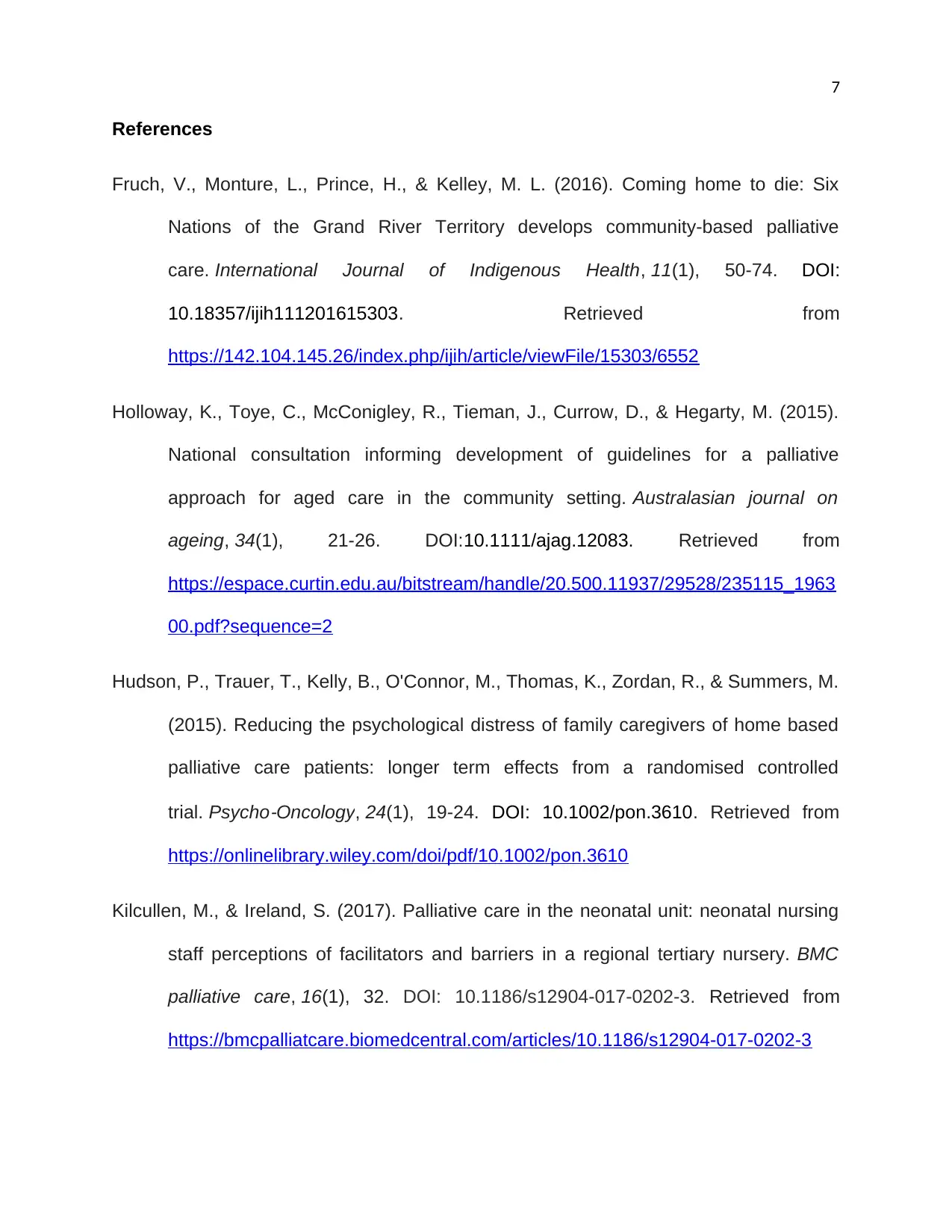
7
References
Fruch, V., Monture, L., Prince, H., & Kelley, M. L. (2016). Coming home to die: Six
Nations of the Grand River Territory develops community-based palliative
care. International Journal of Indigenous Health, 11(1), 50-74. DOI:
10.18357/ijih111201615303. Retrieved from
https://142.104.145.26/index.php/ijih/article/viewFile/15303/6552
Holloway, K., Toye, C., McConigley, R., Tieman, J., Currow, D., & Hegarty, M. (2015).
National consultation informing development of guidelines for a palliative
approach for aged care in the community setting. Australasian journal on
ageing, 34(1), 21-26. DOI:10.1111/ajag.12083. Retrieved from
https://espace.curtin.edu.au/bitstream/handle/20.500.11937/29528/235115_1963
00.pdf?sequence=2
Hudson, P., Trauer, T., Kelly, B., O'Connor, M., Thomas, K., Zordan, R., & Summers, M.
(2015). Reducing the psychological distress of family caregivers of home based
palliative care patients: longer term effects from a randomised controlled
trial. Psycho
‐Oncology, 24(1), 19-24. DOI: 10.1002/pon.3610. Retrieved from
https://onlinelibrary.wiley.com/doi/pdf/10.1002/pon.3610
Kilcullen, M., & Ireland, S. (2017). Palliative care in the neonatal unit: neonatal nursing
staff perceptions of facilitators and barriers in a regional tertiary nursery. BMC
palliative care, 16(1), 32. DOI: 10.1186/s12904-017-0202-3. Retrieved from
https://bmcpalliatcare.biomedcentral.com/articles/10.1186/s12904-017-0202-3
References
Fruch, V., Monture, L., Prince, H., & Kelley, M. L. (2016). Coming home to die: Six
Nations of the Grand River Territory develops community-based palliative
care. International Journal of Indigenous Health, 11(1), 50-74. DOI:
10.18357/ijih111201615303. Retrieved from
https://142.104.145.26/index.php/ijih/article/viewFile/15303/6552
Holloway, K., Toye, C., McConigley, R., Tieman, J., Currow, D., & Hegarty, M. (2015).
National consultation informing development of guidelines for a palliative
approach for aged care in the community setting. Australasian journal on
ageing, 34(1), 21-26. DOI:10.1111/ajag.12083. Retrieved from
https://espace.curtin.edu.au/bitstream/handle/20.500.11937/29528/235115_1963
00.pdf?sequence=2
Hudson, P., Trauer, T., Kelly, B., O'Connor, M., Thomas, K., Zordan, R., & Summers, M.
(2015). Reducing the psychological distress of family caregivers of home based
palliative care patients: longer term effects from a randomised controlled
trial. Psycho
‐Oncology, 24(1), 19-24. DOI: 10.1002/pon.3610. Retrieved from
https://onlinelibrary.wiley.com/doi/pdf/10.1002/pon.3610
Kilcullen, M., & Ireland, S. (2017). Palliative care in the neonatal unit: neonatal nursing
staff perceptions of facilitators and barriers in a regional tertiary nursery. BMC
palliative care, 16(1), 32. DOI: 10.1186/s12904-017-0202-3. Retrieved from
https://bmcpalliatcare.biomedcentral.com/articles/10.1186/s12904-017-0202-3
Paraphrase This Document
Need a fresh take? Get an instant paraphrase of this document with our AI Paraphraser
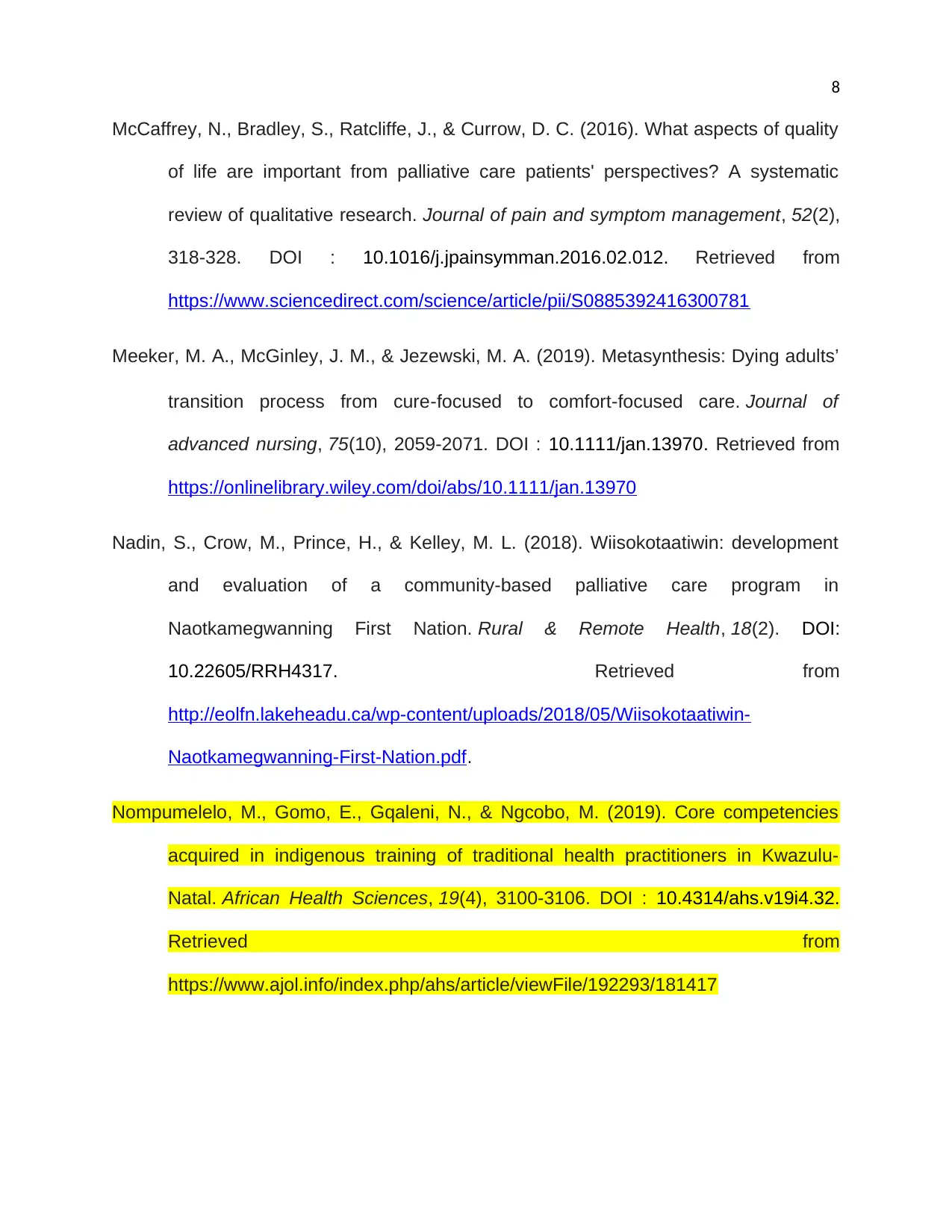
8
McCaffrey, N., Bradley, S., Ratcliffe, J., & Currow, D. C. (2016). What aspects of quality
of life are important from palliative care patients' perspectives? A systematic
review of qualitative research. Journal of pain and symptom management, 52(2),
318-328. DOI : 10.1016/j.jpainsymman.2016.02.012. Retrieved from
https://www.sciencedirect.com/science/article/pii/S0885392416300781
Meeker, M. A., McGinley, J. M., & Jezewski, M. A. (2019). Metasynthesis: Dying adults’
transition process from cure‐focused to comfort‐focused care. Journal of
advanced nursing, 75(10), 2059-2071. DOI : 10.1111/jan.13970. Retrieved from
https://onlinelibrary.wiley.com/doi/abs/10.1111/jan.13970
Nadin, S., Crow, M., Prince, H., & Kelley, M. L. (2018). Wiisokotaatiwin: development
and evaluation of a community-based palliative care program in
Naotkamegwanning First Nation. Rural & Remote Health, 18(2). DOI:
10.22605/RRH4317. Retrieved from
http://eolfn.lakeheadu.ca/wp-content/uploads/2018/05/Wiisokotaatiwin-
Naotkamegwanning-First-Nation.pdf.
Nompumelelo, M., Gomo, E., Gqaleni, N., & Ngcobo, M. (2019). Core competencies
acquired in indigenous training of traditional health practitioners in Kwazulu-
Natal. African Health Sciences, 19(4), 3100-3106. DOI : 10.4314/ahs.v19i4.32.
Retrieved from
https://www.ajol.info/index.php/ahs/article/viewFile/192293/181417
McCaffrey, N., Bradley, S., Ratcliffe, J., & Currow, D. C. (2016). What aspects of quality
of life are important from palliative care patients' perspectives? A systematic
review of qualitative research. Journal of pain and symptom management, 52(2),
318-328. DOI : 10.1016/j.jpainsymman.2016.02.012. Retrieved from
https://www.sciencedirect.com/science/article/pii/S0885392416300781
Meeker, M. A., McGinley, J. M., & Jezewski, M. A. (2019). Metasynthesis: Dying adults’
transition process from cure‐focused to comfort‐focused care. Journal of
advanced nursing, 75(10), 2059-2071. DOI : 10.1111/jan.13970. Retrieved from
https://onlinelibrary.wiley.com/doi/abs/10.1111/jan.13970
Nadin, S., Crow, M., Prince, H., & Kelley, M. L. (2018). Wiisokotaatiwin: development
and evaluation of a community-based palliative care program in
Naotkamegwanning First Nation. Rural & Remote Health, 18(2). DOI:
10.22605/RRH4317. Retrieved from
http://eolfn.lakeheadu.ca/wp-content/uploads/2018/05/Wiisokotaatiwin-
Naotkamegwanning-First-Nation.pdf.
Nompumelelo, M., Gomo, E., Gqaleni, N., & Ngcobo, M. (2019). Core competencies
acquired in indigenous training of traditional health practitioners in Kwazulu-
Natal. African Health Sciences, 19(4), 3100-3106. DOI : 10.4314/ahs.v19i4.32.
Retrieved from
https://www.ajol.info/index.php/ahs/article/viewFile/192293/181417
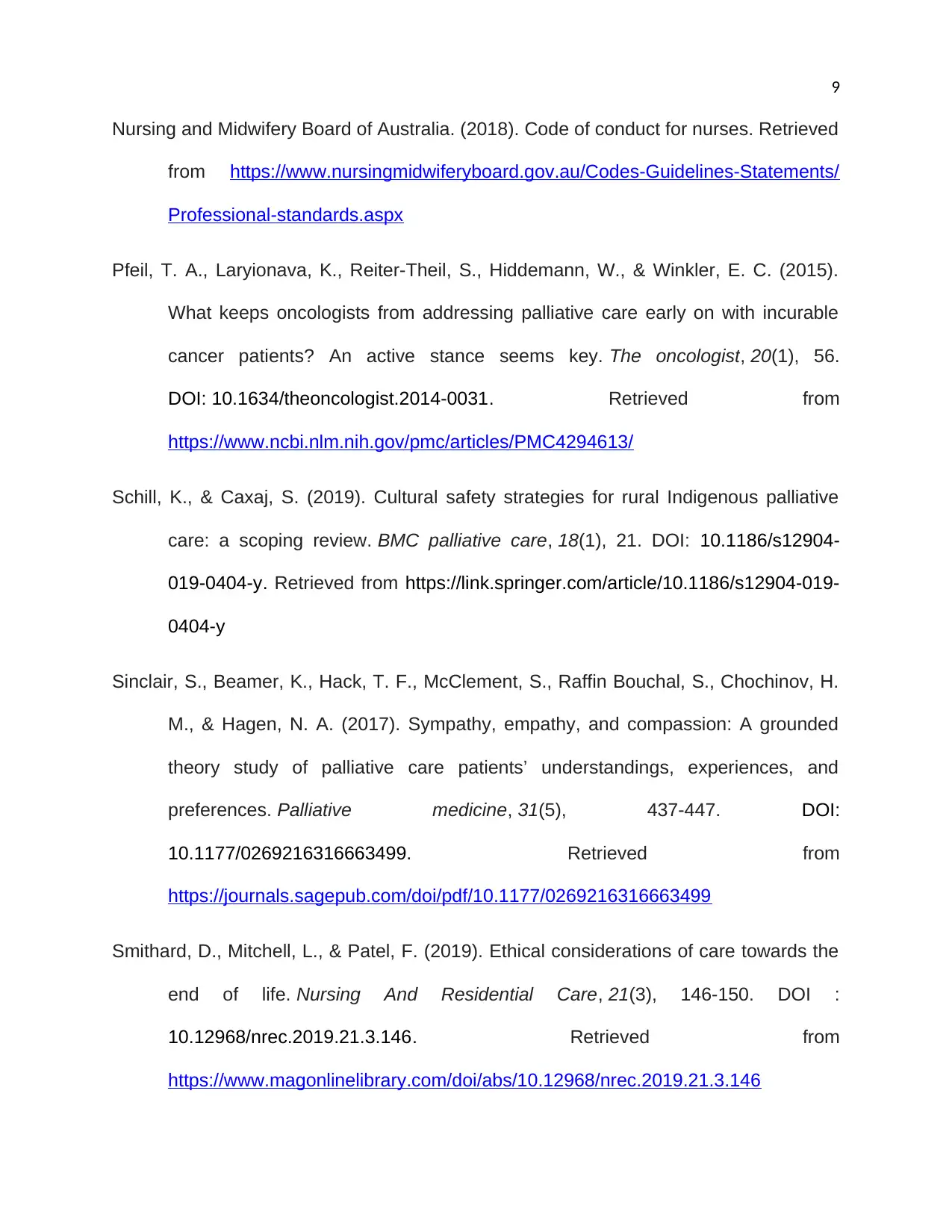
9
Nursing and Midwifery Board of Australia. (2018). Code of conduct for nurses. Retrieved
from https://www.nursingmidwiferyboard.gov.au/Codes-Guidelines-Statements/
Professional-standards.aspx
Pfeil, T. A., Laryionava, K., Reiter-Theil, S., Hiddemann, W., & Winkler, E. C. (2015).
What keeps oncologists from addressing palliative care early on with incurable
cancer patients? An active stance seems key. The oncologist, 20(1), 56.
DOI: 10.1634/theoncologist.2014-0031. Retrieved from
https://www.ncbi.nlm.nih.gov/pmc/articles/PMC4294613/
Schill, K., & Caxaj, S. (2019). Cultural safety strategies for rural Indigenous palliative
care: a scoping review. BMC palliative care, 18(1), 21. DOI: 10.1186/s12904-
019-0404-y. Retrieved from https://link.springer.com/article/10.1186/s12904-019-
0404-y
Sinclair, S., Beamer, K., Hack, T. F., McClement, S., Raffin Bouchal, S., Chochinov, H.
M., & Hagen, N. A. (2017). Sympathy, empathy, and compassion: A grounded
theory study of palliative care patients’ understandings, experiences, and
preferences. Palliative medicine, 31(5), 437-447. DOI:
10.1177/0269216316663499. Retrieved from
https://journals.sagepub.com/doi/pdf/10.1177/0269216316663499
Smithard, D., Mitchell, L., & Patel, F. (2019). Ethical considerations of care towards the
end of life. Nursing And Residential Care, 21(3), 146-150. DOI :
10.12968/nrec.2019.21.3.146. Retrieved from
https://www.magonlinelibrary.com/doi/abs/10.12968/nrec.2019.21.3.146
Nursing and Midwifery Board of Australia. (2018). Code of conduct for nurses. Retrieved
from https://www.nursingmidwiferyboard.gov.au/Codes-Guidelines-Statements/
Professional-standards.aspx
Pfeil, T. A., Laryionava, K., Reiter-Theil, S., Hiddemann, W., & Winkler, E. C. (2015).
What keeps oncologists from addressing palliative care early on with incurable
cancer patients? An active stance seems key. The oncologist, 20(1), 56.
DOI: 10.1634/theoncologist.2014-0031. Retrieved from
https://www.ncbi.nlm.nih.gov/pmc/articles/PMC4294613/
Schill, K., & Caxaj, S. (2019). Cultural safety strategies for rural Indigenous palliative
care: a scoping review. BMC palliative care, 18(1), 21. DOI: 10.1186/s12904-
019-0404-y. Retrieved from https://link.springer.com/article/10.1186/s12904-019-
0404-y
Sinclair, S., Beamer, K., Hack, T. F., McClement, S., Raffin Bouchal, S., Chochinov, H.
M., & Hagen, N. A. (2017). Sympathy, empathy, and compassion: A grounded
theory study of palliative care patients’ understandings, experiences, and
preferences. Palliative medicine, 31(5), 437-447. DOI:
10.1177/0269216316663499. Retrieved from
https://journals.sagepub.com/doi/pdf/10.1177/0269216316663499
Smithard, D., Mitchell, L., & Patel, F. (2019). Ethical considerations of care towards the
end of life. Nursing And Residential Care, 21(3), 146-150. DOI :
10.12968/nrec.2019.21.3.146. Retrieved from
https://www.magonlinelibrary.com/doi/abs/10.12968/nrec.2019.21.3.146
⊘ This is a preview!⊘
Do you want full access?
Subscribe today to unlock all pages.

Trusted by 1+ million students worldwide
1 out of 9
Related Documents
Your All-in-One AI-Powered Toolkit for Academic Success.
+13062052269
info@desklib.com
Available 24*7 on WhatsApp / Email
![[object Object]](/_next/static/media/star-bottom.7253800d.svg)
Unlock your academic potential
Copyright © 2020–2026 A2Z Services. All Rights Reserved. Developed and managed by ZUCOL.





